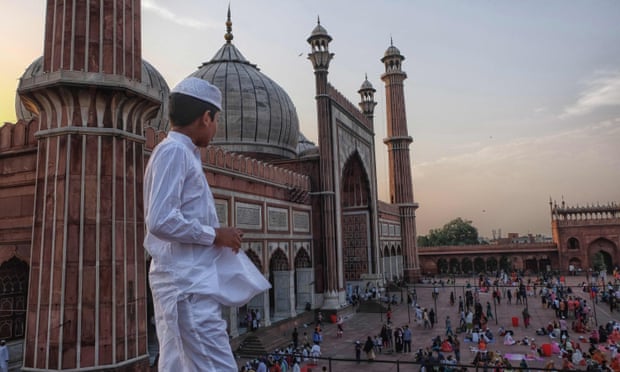- UID
- 20
- Online time
- Hours
- Posts
- Reg time
- 24-8-2017
- Last login
- 1-1-1970
|
|
━━━━━━━━━━━━━━━━━
The Hindu nationalist BJP’s election victory will change the culture of the nation, the prime minister’s critics fear.

Muslims prepare to break their fast during Ramadan at the Jama Masjid mosque in Delhi. Photograph: Noemi Cassanelli/AFP/Getty Images
▼ Just after 1.30pm on Friday, the loudspeaker outside Sarai Alawardi mosque crackled to life, and more than a thousand foreheads were touched to the hessian mats that lined the ground. Towering over them were the skyscrapers of Gurgaon, a satellite town south of Delhi that houses technology companies, bowling alleys and other symbols of the “new India”.
A day after the Hindu nationalist prime minister, Narendra Modi, claimed a landslide election victory, some in the congregation were anxious about whether this new country had a place for them. “These days, it isn’t safe for us here any more,” said Haji Shezhad Khan, the chairman of a local Muslim activist group, sitting in a shaded courtyard a few metres from the mosque.
For many Indian Muslims – whose population of about 200 million would comprise the seventh-largest country on earth – Modi’s emphatic re-electionhas been an isolating experience.
The country’s most acrimonious election campaign in recent history was studded with references to unauthorised migrants from Bangladesh as “termites”, the nomination to parliament of a Hindu accused of terrorism and a debate over whether Mahatma Gandhi’s assassin – who killed the founding father for supposedly cowing to Muslim demands – was in fact a patriot.
Despite this, or perhaps because of it, a record 270 million Indians cast their votes for Modi’s Bharatiya Janata party (BJP) or its allies.
“We truly believed it would be fought back,” said Nazia Erum, an author who has written a book about raising a Muslim child in today’s India. “We believed that a lot of voting that happened in 2014 was based on Modi’s development agenda and people would be able to see through it now and things would be different. And as it turns out we were entirely mistaken.”
Friction between Hindus and Muslims, as well as tension among sects within both faiths, has been a persistent feature of Indian life. But in the past five years violence against Muslims has increased, including at least 36 killings by “cow vigilantes”of cattle farmers and traders accused – usually spuriously – of harming the revered animals.
In Gurgaon, where hundreds of thousands of Muslim migrants have arrived in the past few years along with Hindus to work in factories and on construction sites, tension has been boiling over. Bitter campaigns have been waged against Muslims praying in public spaces because mosques have no capacity or are too far away. Sanctioned prayer spaces have been gradually whittled down to just over three dozen after protests by Hindu organisations. “They are not allowing us to pray,” said Khan.
Rajeev Mittal, the head of a Hindu nationalist group that has campaigned against mosques in the area, insists his campaign is strictly about upholding municipal planning laws. (▪ ▪ ▪)
► Please, continue reading this article here: Source |
|